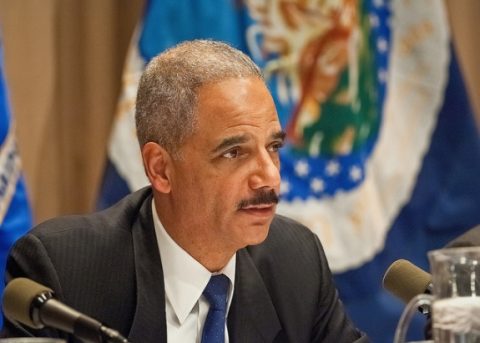Immigration Reform

New Report Predicts Continuing Integration of Immigrants into U.S. Society
Anti-immigrant activists like to pretend that immigrants are destined to be poor and to never successfully integrate into U.S. society. However, a new report from the Center for American Progress (CAP) concludes that, in reality, “immigrants are integrating into American life, learning English, and becoming homeowners.” When socioeconomic advancement is tracked over time, it becomes clear that “far from a life in poverty, immigrants are exemplifying the American Dream.” The report, entitled Assimilation Tomorrow, was co-authored by renowned demographer Dowell Myers (a professor in the School of Policy, Planning, and Development at the University of Southern California) and by John Pitkin (president of Analysis and Forecasting, Inc., in Cambridge, Massachusetts). This report is the companion piece to another study which was released by CAP last year, entitled Assimilation Today. Read More

Policing the Enforcers: Criminalizing Alabama Employees Encourages Discrimination
Alabama lawmakers want undocumented immigrants to be so afraid of the consequences of the state’s new anti-immigrant law (HB 56) that they leave the state. However, that’s not the only fear factor built into the law. Under section 6(f), state and local government employees must report violations of HB 56—which includes unlawfully present immigrants even attempting to complete a business transaction with the government—or face criminal penalties. In order to avoid criminal prosecution, government employees are likely to be suspicious of foreign-looking or sounding people. But the new law does not include details or require specialized training for state employees, making discrimination, mistakes and civil rights violations all the more likely. Read More

Non-Citizens Eager to Serve in U.S. Military Blocked by Government Bureaucracy
BY MARGARET D. STOCK, COUNSEL TO THE FIRM, LANE POWELL PC This Veterans Day, we celebrate those who have proudly served in the U.S. military, including immigrants. Immigrants have long served in all branches of the U.S. military as infantry soldiers, medics, foreign-language translators, and in every other job open to them. At last count, foreign-born service members made up about 8% of the 1.4 million military personnel on active duty. However, some highly qualified non-citizens have been blocked from serving due to the Obama Administration’s suspension of a recruiting program called the Military Accessions Vital to the National Interest (MAVNI). Frustrated by the government bureaucracy responsible for halting MAVNI, those non-citizen volunteers are petitioning the government in hopes of reopening the program. Read More

Even Facebook Feels Brunt of Broken U.S. Immigration Policy
You know things are bad when a company as popular as Facebook has problems finding qualified talent. In a recent interview, Facebook’s chief operating officer, Sheryl Sandberg, remarked that our outdated immigration policy is a big reason Silicon Valley tech companies are fighting each other for highly skilled workers. Current immigration policy limits high-skilled worker visas (H-1B) to only 65,000 per year—a number that hardly meets demand. Even technology giant Microsoft recently testified before Congress that current immigration policies make finding talent a serious challenge. Until lawmakers revamp our outdated immigration system, technology companies like Facebook and Microsoft will continue to lose out on the foreign talent they need to stay ahead of the curve. Read More

Arizona’s SB1070 Champion, State Senator Russell Pearce, Loses in Recall Election
Arizona state senator Russell Pearce, the leading force behind Arizona’s SB 1070 and other anti-immigrant legislation, was defeated in a recall election Tuesday. Fellow Republican Jerry Lewis—a moderate on immigration issues—won with 54% of the vote. Citing Pearce’s narrow anti-immigrant agenda and the damage SB 1070 inflicted on the state, a group called Citizens for a Better Arizona began the recall effort back in January. Today, many in Arizona and across the U.S. celebrate Pearce’s defeat as a victory for practical solutions over extremist rhetoric and anti-immigrant proposals. Pearce is believed to be the first Arizona state legislator to face a recall election. Read More

Provisions in Alabama’s Immigration Law Go Further Than You Think
It’s no stretch to call Alabama’s new immigration law (HB 56) extreme—especially the provision (since enjoined) which required schools to check the immigration status of students and made it a criminal misdemeanor for an unauthorized immigrant to fail to carry immigration documentation. Two provisions that may have flown under the radar, however, are the contract and business transaction which infringe on individuals’ ability to navigate everyday life (such as access to water) and leave them vulnerable to exploitation and abuse. Sadly, this is exactly what the law’s author had in mind. A new report, Turning Off the Water: How the Contracting and Transaction Provisions in Alabama's Immigration Law Make Life Harder For Everyone, analyzes just how far these provisions go. Read More

Remembering the Benefits of IRCA, 25 Years Later
Twenty five years ago this week, President Ronald Reagan signed the Immigration Reform and Control Act (IRCA), an immigration reform bill which, despite a contentious debate, managed to pass a Republican Senate and a Democratic House. In fact, Reagan called the immigration bill one of the “most difficult legislative undertakings of recent memory” but one that “further generations of Americans” would “be thankful for.” And Reagan wasn’t wrong. Despite criticisms from both restrictionists and advocates that IRCA failed to address future waves of immigration, the benefits of IRCA—as well as the bipartisan support needed to pass it—should give our current congressional leaders something to think about. Read More

Congressional Members to Join Civil Rights Groups in Fight Against Alabama’s “Juan Crow” Law
In the days following passage of Alabama’s extreme immigration law (HB 56), many business, religious and civil rights leaders spoke out about the law’s damaging impact on immigrant communities, farms, businesses, and schools. Since then, many notable community and civil rights leaders have stepped forward to add their voice to those demanding a repeal of the law. The Alabama NAACP, for example, recently joined immigrant rights groups to call for an end to what one African American minister described as “Alabama’s worst times since the days of segregation and Jim Crow.” This week, Illinois Congressman Luis Gutierrez met with members of several congressional caucuses—Hispanic, Black, Asian Pacific American and Progressive—to address what he calls Alabama’s “civil rights emergency.” Read More

DOJ’s Lawsuit Against South Carolina Latest Legal Challenge to State Immigration Laws
BY KAREN TUMLIN, MANAGING ATTORNEY, NATIONAL IMMIGRATION LAW CENTER Yesterday, the U.S. Department of Justice (DOJ) filed suit against South Carolina, challenging the state’s extreme anti-immigration law (SB 20). With this action, the Department of Justice charges that South Carolina, like Arizona and Alabama, have passed unconstitutional immigration laws. Civil rights groups (including the National Immigration Law Center) agree. Coalitions have filed suit in five states—Utah, Indiana, Georgia, Alabama, and South Carolina—that passed their own Arizona-inspired laws in 2011. Fortunately, most of these states have seen their new, misguided laws lose much of their bite through civil rights coalition-led legal challenges. Here’s a round-up of the status of these legal cases. Read More

Alabama Law Enforcement, Courts Implementing New Law in Different Ways Across State
As if things weren’t chaotic enough in Alabama, reports now find that law enforcement and courts vary widely on how they apply the state's new immigration law, creating different rules and consequences for individuals depending on a judge or officer’s understanding of the law. As the controversial law (HB 56) itself continues to change as it makes its way through the court system, many law enforcement officers are unclear about which provisions still stand and have yet to receive the training necessary to implement the law. Judges, too, are on different pages on how to interpret the law, meaning that an individual might receive a different ruling from one judge to the next depending on the judge's understanding of the law. Read More
Make a contribution
Make a direct impact on the lives of immigrants.
